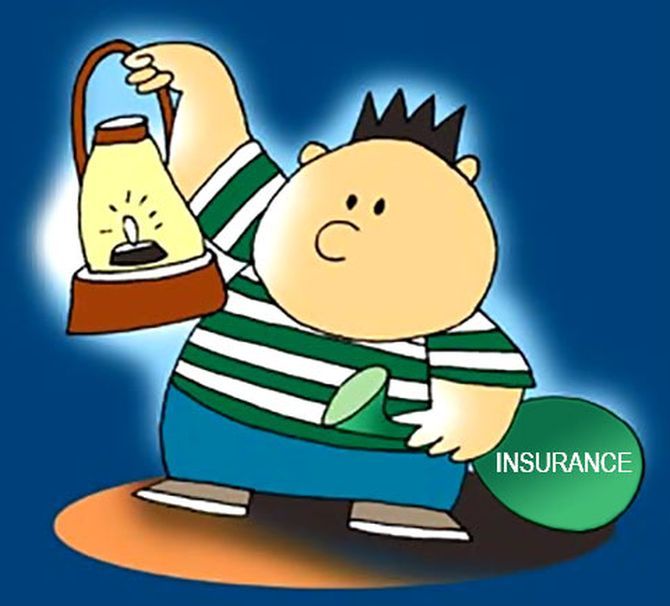Your entire contribution can go down the drain if policies are not renewed on time
Illustration: Uttam Ghosh/Rediff.com

Insurance policies always have a fixed term, through which they needs to be renewed on a regular basis.
But often with our busy schedule and other social responsibilities, we miss out on the due date.
The impact of delay in renewing insurance policies, however, can be worse than you would think.
Here are few consequences you should know about this delay:
Motor insurance
Unlike other assets like real estate and gold where the owner may or may not opt for insurance; insuring your motor vehicles is compulsory in India.
Considering the amount of loss or damage that a vehicle might cause to human body or property, using an uninsured vehicle in a public place has been made an offence under the Motor Vehicles Act, 1988.
Hence using a vehicle without getting the insurance renewed on time is an offence in the eyes of law and you may be fined for violating the traffic rules.
To top this a motor insurance policy clearly mentions the exact date and time from which the cover becomes effective and when it will terminate.
Timely renewal of an insurance policy is important as a gap of even one day might result into break in the policy, failing which you will not be able to avail the said benefits.
In case of theft or accident caused by an uninsured vehicle, the insuring company is not liable to pay a single penny for the damage.
Consequent buying of a new policy will result in a higher premium, and your car may be up for inspections as well.
Health insurance
The most useful insurance in recent times is a good medical policy, given the cost of medical expenditures have shot up for which liquid funds may not be available.
In lieu of the policy holding so much importance it is imperative you do not miss this date.
In case you do here’s what can happen:
Your health insurance company could end your coverage if you fall behind on your monthly premiums.
But before your insurance company can end your coverage, you have a short period of time to pay. This is called a "grace period."
Insurers allow a grace period for you to renew your policy, extended to a maximum of 30 days, from the date of renewal.
In case you miss the grace period, your policy becomes redundant.
You will lose all benefits associated and unlike a life insurance premium, you will not get any money back either.
Your only option is to buy a new one and make sure you never miss your renewal date.
To avoid this, authorise your bank or the insurer to deduct your monthly/quarterly premium from your account in order not to miss any due date.
Life insurance
This is the most common form of insurance taken by individuals and righty so most common for them to forget when their premiums are due.
Luckily when it comes to penalties, life insurance policies are the most relaxed as even in the worst scenario you will get some amount of money back.
The rues in penalties differ according to the insurance plan you hold - term or endowment.
All policies other than term are generally easy to renew with a penalty to be paid, which differs from insurer to insurer.
If a person forgets to pay his premium on the due date, any mode (quarterly, half yearly and annually other than monthly), he or she can pay within a 30-day grace period.
For term however, the lapse period becomes crucial as should the policy have been lapsed for more than six months, the life assured would once again have to go through medical tests.
In case you want to withdraw the money you put in, you still have to renew your policy and cannot do it in lapse condition.
However, for this you must have crossed the minimum benchmark period, which varies across insurers.
In case you want to take out the money you have invested in your premium from your non-life term plans you can do so by surrendering the policy.
For Unit Linked Plans (ULIPS), however, the surrender value can be quite less in comparison to the premium paid, depending on the number of years the policy has been in force.
Adhil Shetty is CEO of Bankbazaar
BankBazaar.com is a leading online marketplace in India that helps consumers compare and apply for credit card, personal loan, home loan, car loan, and insurance.










